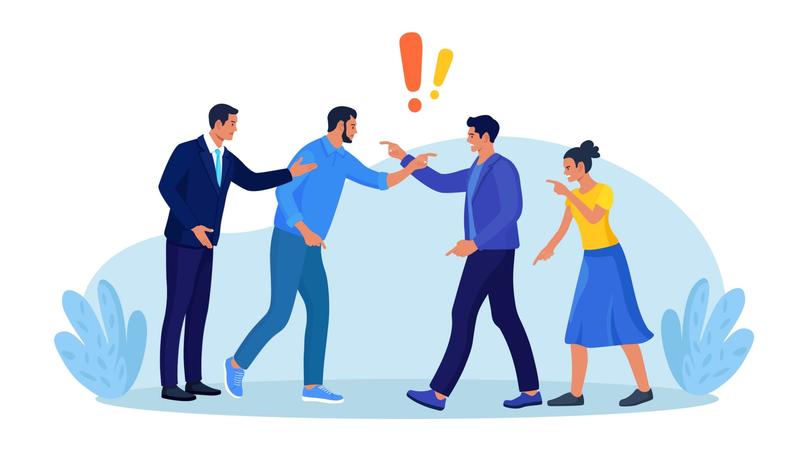How To Make Up With a Person and Improve a Relationship. A Guide for Those Who Are in Dispute
Of course, quarrels happen for very different reasons, but, no matter how serious and confusing they seem, they are all resolved according to the same script.

It does not matter whether you have a workplace or a family conflict, with your loved one or your business partner. If you realize that it cannot go on like this, you've reached the boiling point and are looking for a way out of the situation - then this guide is for you!
What to do right after a quarrel

Give yourself time to calm down. It is only appropriate to go talk and make up right away, if:
-
you have somehow insulted the person or unreasonably accused them;
-
you are no longer angry, you quickly cooled down and do not feel any resentment, frustration or other negative emotions that affect your thoughts and behavior;
-
the person wants to make up and is the first one to make contact. Jump at this chance and don't put it off!
In all other cases, give yourself time to get over the strong emotions, because they will prevent you from effectively taking all subsequent steps. The more serious the conflict and the more pronounced the emotional reaction it elicited in you, the longer it takes to calm down. There is, however, a saying, "Don't go to bed angry," and this is partially true. But, again, just partially. Your "calming down time" shouldn't last for weeks - give yourself no more than a day or two. Your goal is not to achieve total Zen and indifference, but to regain emotional stability so you don't go back to excesses.
If you try to talk to the person while one of you is still angry, you are unlikely to hear each other out.
Allocate some personal space for yourself. We calm down faster when we're away from the stress source - that is the person who you quarreled with. If it's in the office, ask for permission to work from home, a café or at least a remote desk next day. Or if it's at home, go to visit your parents for the day, or stay late at work, or, conversely, simply go to an exhibition. Preferably you should be alone, not joining other people's company. Firstly, you'll otherwise get distracted from your emotions, not relive them (it's not the same), and secondly, the person you're in conflict with may think you "replaced" them, which will make the situation worse.
Note: Do not replay the situation over and over in your mind and don't try to analyze it. You'll need to analyze it later, together with your interlocutor. Right now, let yourself be angry and resentful, without evoking rationality or critical thinking.
Understand what motivates you. There are two kinds of motivation in conflict:
-
Belligerent. You're trying to establish who's right and who's wrong so that "justice is served" or to punish one of the sides;
-
Peaceful. You want to clarify the needs of both parties in order to find a solution that will work for everyone.
You can easily guess that, if you feel belligerent you shouldn't confront the other party, let alone try to reconcile with them. It is imperative to put yourself in the "peaceful" mode before a discussion begins. If you notice that your interlocutor has the same motivation, then extend your break and do not return to "truce talks" until their motivation changes or wanes. Telltale signs of belligerent motivation are, generally the questions your interlocutor asks. For example, "Who, in your opinion, is at fault here?", "How long will this go on?" (A generalization), "Isn't it clear that..." (Imposing an opinion), and "When are you going to finally..." (Indirect or direct accusation).
See if you are ready to make up. Some time later, when you don't feel belligerent any more, and the negative emotions subside, ask yourself:
-
How confident am I that I can calmly discuss what happened?
-
Am I ready to listen to the other person's position and understand their emotions, views and opinions, even if they contradict mine?
-
Will I be able to avoid blaming the other person for what happened?
-
Am I willing to honestly share my feelings?
If you answer "Yes" to all the questions, then you can move on to reconciliation. But make sure the other person is ready to act likewise - ask them directly and give them more time, if necessary.
Tip: Try to look at the quarrel as a puzzle game where you have to be flexible, creative and empathic in order to come to an agreement and find a win-win resolution to the conflict. The discussion will go more easily if you view the conflict as a way to make the relationship stronger and even to improve your communication skills, rather than as a battle and a threat to your self-esteem.
What to do for and when you are making up

Offer to meet and talk. Perhaps, you feel tempted to talk things out over the Internet or the cell phone, but, it is really not enough to repair the relationship (especially if the disagreement is serious). Invite the person to a meeting with an open and clear intention to talk. But do not invite them to your home and don't try to get invited! Choose a comfortable and pleasant neutral territory. If anything, the other people around will not allow a quarrel to break out, nor associations with the past will arise.
Note: If the person disregards your message, send it the next day or the day after. Give them a call if even after that you get silence in reply. But remember, you can't force a person to make up with you, if they don't want to as much as you do.
Set boundaries. It's important to minimize the risk of reigniting the old argument. So when you and the person meet again, discuss - early on in the conversation - what both of you MUST AVOID doing under all circumstances. For example, reproduce the statements made during the quarrel or use the accusatory tone, hurtful remarks, etc. Agree to maintain a positive spirit in your communication. For this purpose you can choose, for example, a cafe, where delicious coffee and desserts will ease the tension.
Clarify all the circumstances. It's human nature to distort reality, we all perceive the same situation differently, and we all react differently to it. For example, you had a fight with your partner because they had forgotten about the anniversary. They were stressed out about a difficult project at work or they don't at all take anniversaries seriously and they were unaware of (or didn't take into account) your different attitude.
You can take a sheet of paper and write down all the circumstances. They should sound as facts, without emotional coloring or subjective judgment. For example, "I was busy at work and forgot what day it was," but not, "I didn't care that it was our anniversary."
Take turns telling each other about your triggers and feelings. After that, focus on how each of you felt before and at the time of the argument. We all have pain points. Let's say it's important for you that the anniversary be remembered because your parents always celebrated it. Or they never did, you grew up in a not-so-happy family and you want things to be different. So you felt lonely and unhappy when your expectations fell through. Let the person you're talking with do the same, maybe they were focused on the project and fret about it, and they just don't have the energy and inner resources to meet your expectations. However, from now on, they will know how important anniversaries are for you, and you'll keep in mind that they need to be reminded of them.
Note: Never, under any circumstances interrupt or use the "but I..." construct. It doesn't matter what order you speak in - they will hear you out anyway, because that's the reason for your meeting.
Make sure you get each other right. This is where the classic active listening technique comes in. When the other person finishes, ask:
-
Do I understand it correctly that...
-
Could you clarify why you did it this way instead of that way? Because… Or…
-
Is there anything else I missed / don't see in this situation?
Agree on changes. In the process, you'll probably figure out how you can make sure that such situations never occur again. For example, agree to move your anniversary dinner to the weekend or put reminders on your calendar about such events. You can even write down in notes or paper what, where, and when you decide to do it so that both parties are happy. You can also add to your family or workplace rule book some sort of item that forbids you from doing the thing that caused the situation in the first place (like ignoring calls), etc.
What to do after you mend the relationship

Do something fun together. Even though you managed to identify the cause of the conflict and resolve it, both of you may have a bad feeling afterward. The best way to get rid of it and smooth things over once and for all is to arrange a joint activity. For example, go on a trip that you've put off for a long time, or go the movie theater for an exciting film. It is essential after a quarrel to "replace" negative experiences with positive ones, to train the brain that there is nothing wrong with quarrels and that they are always followed by something pleasant.
Put the changes into practice. Don't let yourself or your partner forget about your agreements. Immediately set a timeline within which the changes in your relationship or the solution itself (if it requires one) should be implemented. A lot of people go back to the way things were after the conflict's acute phase subsides, and turn it into a chronic one. The situation is like a disease: if not properly treated, it progresses and recurs.
Continue trying to get an insight into the person and their reactions. It's normal to have disagreements; we can't get into another person's brains. So when a misunderstanding occurs, it's essential to act on the premise that you know but very little and the information is scarce. Pay attention not only to the person's preferences but also to their triggers - this will help prevent similar occurrences in future.
Lectera’s Online Courses by topic
List of taboos if you are in dispute
We have compiled for you a list of taboos you should always avoid if you do not want to allow the conflict to escalate and drag on. So, absolutely DO NOT:
-
Try to make up just so that "it's over," or "the other person will be happy." We mentioned concessions above, but not total self-sacrifice. It's also applies to trying to make up when you're on edge just because "you're used to settle everything here and now."
-
Pretend that nothing happened and behave as usual. That way the conflict is not resolved but frozen and it often flares up again later.
-
Ignore the person (especially if you expect them to apologize). Or abruptly establish a distance without an explanation. Even when you leave to calm down, it's important to let the person know of your intention, rather than just escape.
-
Refuse to acknowledge your involvement in the argument. All conflicts happen because of mutual actions, not just those of one person.
-
Skip apologizing. You may not be directly responsible for the conflict. But you probably snarled at least once, raised your voice, or interrupted the person. Admit it: "I shouldn't have argued without listening you out. I've drawn some conclusions, I'm sorry."
-
Be afraid to discuss the quarrel or use mental manipulation techniques. All of these produce short-term results. If you want to continue a long-term relationship, the only way out is to follow the script above.
-
Keep pushing to make up if the other person doesn't want to. Sometimes relationships end, there's nothing you can do about it. And it's important to respect the other person's choice to be angry with you or refuse to communicate. In such circumstances, the only thing to do is to accept it and move on.
Share this with your friends via:
Latest News

In the UK, £23 million has been allocated for the expansion of the EdTech Testbed program — pilots of educational technologies in schools and colleges.

In the US, Tuskegee University announced the launch of Tuskegee University Global Campus (TUGC) — a new online platform for distance learning.

A significant stage in the development of the alternative education system has begun in West Northamptonshire in the UK: the County Council is actively calling on parents, guardians, and trustees to participate in shaping the future of this key area.

Outwoods Primary School in Atherstone, Warwickshire, having experienced deep sadness after the loss of their famous cat, Silla, has found solace in a new pet – a Maine Coon named Aloysius O’Hara.

In modern universities, artificial intelligence, and in particular ChatGPT, is rapidly transforming from a controversial tool into a full-fledged student assistant.












 Spring skills audit: what to remove, strengthen, and “sow” in learning
Spring skills audit: what to remove, strengthen, and “sow” in learning
 9 Career Mistakes Young Professionals Make
9 Career Mistakes Young Professionals Make
 £23 million allocated for the expansion of EdTech Testbed in the UK
£23 million allocated for the expansion of EdTech Testbed in the UK
 Test: How Psychologically Mature Are You? Check Your Inner Foundation.
Test: How Psychologically Mature Are You? Check Your Inner Foundation.
 Test. Check Your Social Media Dependency Level!
Test. Check Your Social Media Dependency Level!
 Test: What Business is Right For You?
Test: What Business is Right For You?
